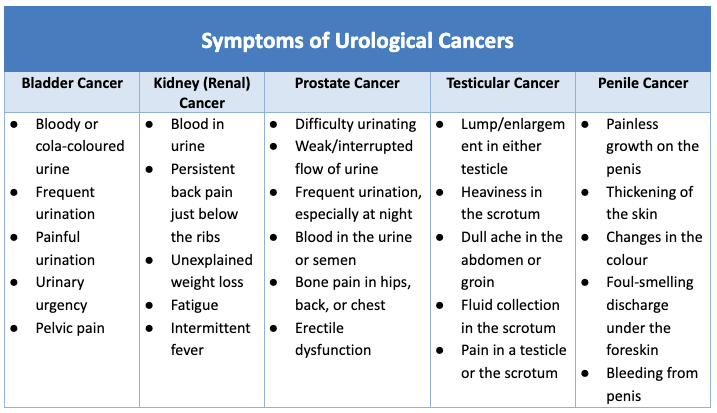
Urologic cancers refer to cancers of the urinary tract (kidney and bladder), prostate, and reproductive organs in men - testicles and penis. These cancers are growing at an alarming rate in India. A report by ICMR suggests that urologic cancers have tripled in the last 30 years in India, directing towards a major health issue that needs immediate action. Thus, it becomes paramount to know about urological cancer types, risks, and current advancements to prevent, diagnose early, and manage them efficiently.
Synopsis
Urological Cancer Types
There are different types of urological cancers, usually named after the location where they develop.

Symptoms of Urologic Cancers
Symptoms vary based on the cancer type. Below we have listed out common symptoms of urological cancers:

Treatment of Urological Cancer
Management of urological cancer is a multifactorial decision. One or a combination of various therapies like chemotherapy, radiation therapy, surgery, or supportive care are commonly used to manage the disease.
Surgery
Surgery is the most common method to treat most urological cancers wherein the cancerous tumour is extracted surgically. Advancements in surgical methods have made them the treatment of choice wherever possible.
Minimally invasive procedures, like Transurethral Resection Of Bladder Tumour (TURBT), can help diagnose and treat early-stage bladder cancer. They offer smaller incisions, less pain, and quicker recovery times compared to traditional surgeries. Radical cystectomy is carried out when the entire bladder and nearby lymph nodes require to be removed.
For renal cancers, Partial or Radical Nephrectomy is performed to remove parts or the entire affected kidney, along with the adrenal gland and surrounding lymph nodes. Similarly, Prostatectomy with minimally invasive/laparoscopic or robotic assistance can be used to treat prostate cancer.
Radiation Therapy
Radiation treatment uses powerful charged rays to eradicate cancer cells. It is of two types:
-
External beam radiation therapy: projects radiation onto cancer from the outside of the body.
-
Internal beam radiation therapy (brachytherapy): It requires embedding radioactive substances straight into or close to the malignant growth. This therapeutic method is used in prostate and bladder cancers.
Chemotherapy
Chemotherapy utilises drugs to eliminate cancer cells. This is mainly done by stopping the growth and division process of these cells. It is either taken orally or injected into the body, typically used when cancer has metastasised beyond its initial area. It's also utilised after surgery as an additional therapy to remove any leftover cancerous cells. The effectiveness of chemotherapy depends on the cancer type and its progression stage.
Targeted Therapies
Unlike chemotherapy, which harms all rapidly dividing cells, targeted treatments aim to attack cancer cells in a more targeted manner, saving more of the body's regular cells and reducing side effects. Medications like cabozantinib are used as targeted therapy for advanced renal cell carcinoma.
Immunotherapy
Immunotherapy enhances the body's inherent capacities to battle cancer. It is widely used to treat metastatic bladder cancer and renal cell carcinoma.
The battle against urologic cancers is now more successful due to the advancements in healthcare and technological innovations. Being aware, detecting early, and knowing about the risk elements play a crucial role. In methods like radiation therapy and targeted gene therapy, the prognosis of the treatment has improved significantly, improving post-cancer quality of life for patients.
For more information about urologic cancers and their treatment, visit Manipal Hospital Whitefield and contact our top urologists in Bangalore.
FAQ's
The most common types of urological cancer are cancers of the kidneys, bladder, prostate, and testicles.
The most common symptoms include weak urine stream, pelvic discomfort, and difficulty in holding back or starting to urinate.
The best method to detect a urologic cancer is a urinalysis/cytology.





















 4 Min Read
4 Min Read












